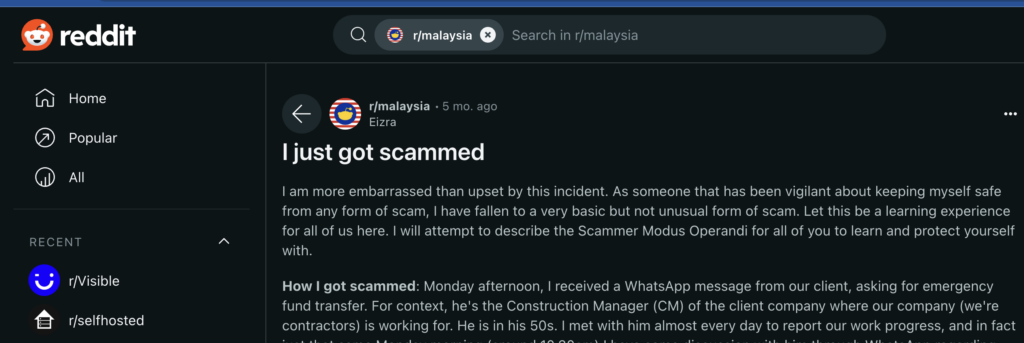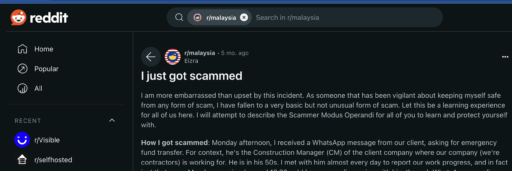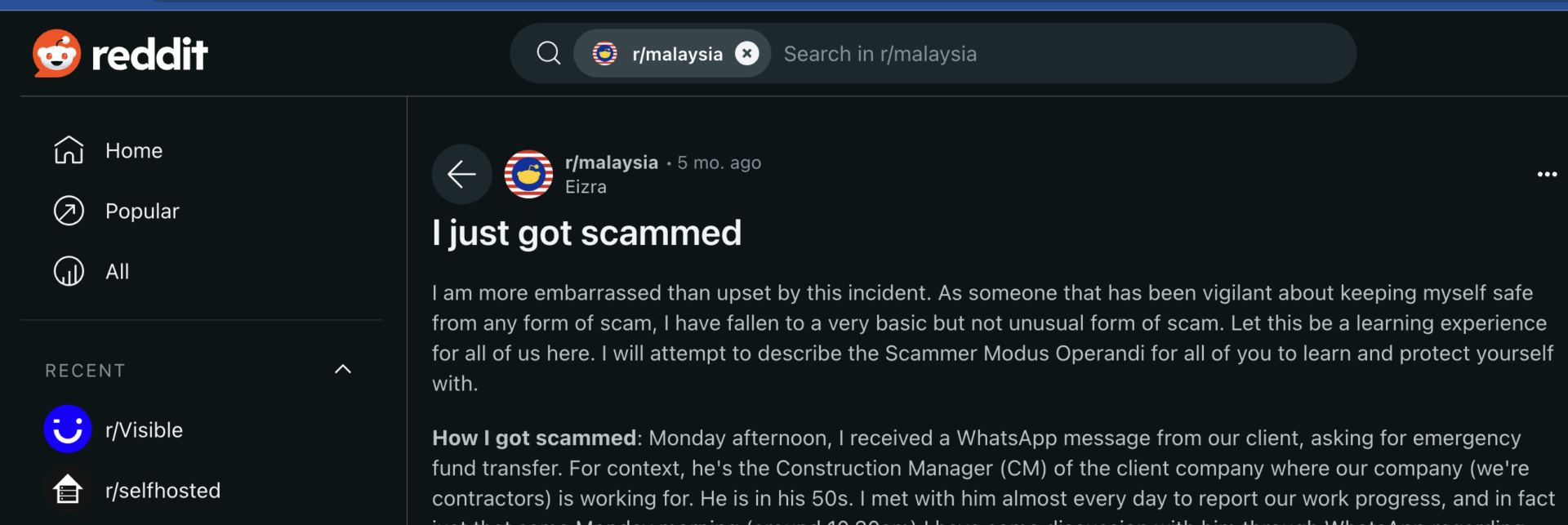In a recent post on the r/malaysia subreddit, a user shared their unfortunate experience of falling victim to a sophisticated WhatsApp identity theft scam. This case study serves as a stark reminder of the ever-evolving tactics employed by scammers and the importance of staying informed and proactive. (Link to Reddit Post)

Reddit Post in r/Malaysia
The Scam Unfolded
The victim, who was a contractor working with a construction manager (CM), received a WhatsApp message from the CM requesting an emergency fund transfer. The request appeared legitimate, as the victim had communicated with the CM earlier that day regarding work-related matters.
Unbeknownst to the victim, the CM’s WhatsApp account had been compromised through a clever social engineering tactic. Earlier that day, the CM received a message from a supposed “friend” in a WhatsApp group, claiming that they were implementing security measures to protect the group from scammers. The “friend” instructed the CM and other group members to share a unique 6-digit code they would receive, supposedly for verification purposes.
What the CM didn’t realize was that this 6-digit code was actually the one-time password (OTP) used to set up a new WhatsApp account on a different device. By sharing this code with the scammer, the CM inadvertently gave them full access to their WhatsApp account.
The scammer wasted no time in exploiting this access, immediately reaching out to the CM’s contacts, including the victim, requesting emergency fund transfers under the guise of the CM’s identity.
Scam Indicators and Tips
While the request appeared legitimate, there were several red flags that could have alerted the victim to the potential scam:
- Unexpected Urgent Requests: Scammers often create a sense of urgency to pressure victims into acting quickly, without fully considering the implications. Be cautious of any unexpected requests, especially those involving financial transactions.
- Unfamiliar or Suspicious Recipients: In this case, the victim was asked to transfer funds to an unknown third party’s bank account, which should have raised suspicions.
- Verification Code Requests: Never share sensitive personal information, such as one-time passwords or verification codes, with anyone, even if they claim to be a trusted contact or authority figure.
To better protect yourself from similar scams, consider implementing the following advanced tips:
- Enable Two-Factor Authentication (2FA) on your accounts, which adds an extra layer of security beyond just a password.
- Use a secure messaging app with end-to-end encryption for sensitive communications, reducing the risk of account compromise.
- Regularly review your privacy and security settings on messaging apps and social media platforms to ensure they are appropriately configured.
- Be cautious of unsolicited messages, even from known contacts, as their accounts may have been compromised.
- Educate yourself and stay informed about the latest scam tactics and techniques used by cybercriminals.
Report Scams to ScamCheck Malaysia
If you have encountered a similar scam or suspect that you have fallen victim to one, we urge you to report the incident to ScamCheck Malaysia. By sharing your experience and providing details about the scam, you can help us raise awareness and prevent others from becoming victims.
To report a scam, visit our website at scamcheck.my/report or send us an email at report@scamcheck.my. Your information will be treated confidentially and will assist us in tracking and combating these types of scams more effectively.
By staying informed, implementing proactive security measures, and reporting scams, we can collectively work towards creating a safer online environment for all Malaysians.


